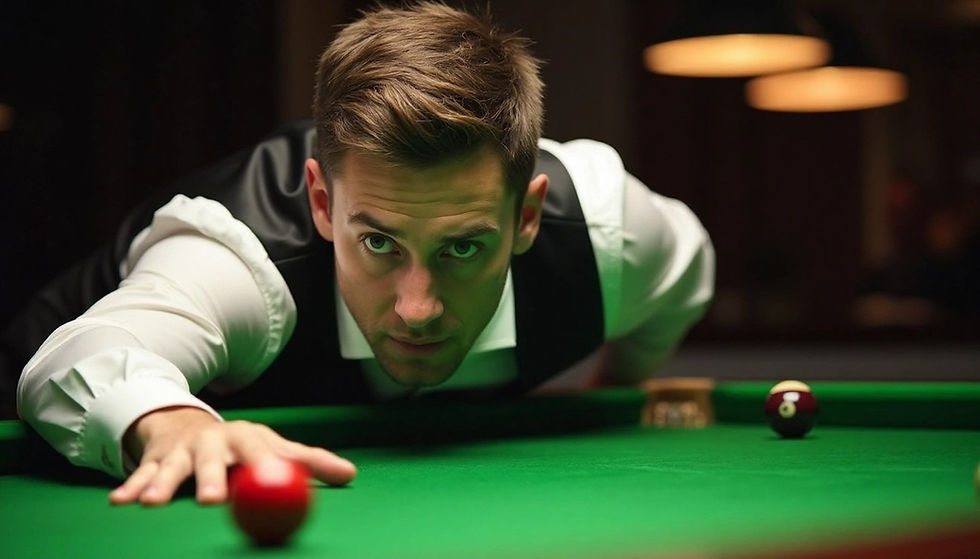How to Master Mental Preparation for Snooker: A Champion's Training Guide
- Dr Paul McCarthy

- Aug 1, 2025
- 9 min read

Did you know that proper mental preparation in snooker can make all the difference between average players and champions? Focus serves as the backbone of any athlete's success, particularly during high-pressure competitions.
The mental game in snooker reaches way beyond technical skills. Top snooker players don't just show off their shot-making skills - they display remarkable mental strength when pressure mounts. Players need to shine when the stakes are high. That's why every serious player must develop strong mental strategies and tips. On top of that, visualization helps athletes rehearse their moves mentally and creates a success blueprint. Many players now include mindfulness meditation and concentration drills in their daily training.
In this piece, we'll dive into the mental skills that lift snooker performance. You'll learn practical ways to build mental strength and stay resilient through inevitable setbacks. These champion-tested methods will help you deliver your best performance when it counts - whether you're gearing up for your first tournament or fine-tuning your mental game after years of competing.
Understanding the Mental Game in Snooker
Professional snooker's biggest battles happen between the ears rather than on the baize. The psychological dimension is a vital component of the game and often determines the winner in closely contested matches.
Why mental preparation matters
Technical skills can only flourish on a solid foundation of mental preparation. Players must maintain razor-sharp concentration throughout lengthy matches, which makes mental resilience essential in snooker. Tournament play tests a player's mental sharpness for hours—sometimes over multiple days—and pushes cognitive endurance to its limits [1].
Snooker's psychological elements extend beyond focus. Players must develop emotional control to handle competitive ups and downs. A player's long-term success depends on maintaining confidence despite setbacks. Six-time World Champion Steve Davis captured this perfectly: "The constant challenge is to play as if it means nothing when it means everything" [1].
Practice performance and competitive results differ mainly due to mental preparation. Many professionals excel during training but struggle to match that form in tournaments. This gap exists because practice environments lack competitive pressure [1].
How snooker challenges the mind differently than other sports
Snooker's mental challenges stand apart from most sports. The game's frustration factor is exceptional. A tennis player loses just one point after a bad shot and play continues, but a snooker player's mistake can lead to helpless waiting while their opponent takes control [1].
The game offers no physical outlet to release tension. Basketball players channel frustration into defensive intensity and soccer players might make a hard tackle, but snooker players must contain their emotions while cameras capture every expression [1].
Snooker demands extraordinary focus. Often called "chess on a table," players must see angles, predict ball movements, and evaluate how current decisions affect potential shots five or six turns ahead [2]. This mix of strategic thinking and precision creates a unique mental burden.
The game's solitary nature amplifies these challenges. Players face competitive pressure alone—they travel solo and practice in isolation [3]. This combination explains why many top professionals now work with sports psychologists to enhance their mental game [4].
Core Mental Skills Every Snooker Player Needs
Mental skills are the foundations of success in snooker. These skills separate weekend players from champions. Players can develop these vital abilities that determine performance under pressure through disciplined practice and proper technique.
Focus and attentional control
A player's knowing how to maintain laser-sharp concentration is a vital mental skill in snooker. Elite players show remarkable focus and stay present even when matches last for hours or days. This exceptional attentional control lets them calculate angles, visualize where balls will go, and plan multiple shots ahead with mathematical precision. Players need what pros call "quiet eyes" to maintain this level of concentration. This technique involves looking longer at the object ball right before striking. One player's success rate for long pots increased by 37% using this method [5]. Professional players then develop pre-shot routines that act as mental anchors to help them enter a focused state before each stroke.
Emotional regulation under pressure
Your emotional state directly affects your performance on the snooker table. Players must learn to handle frustration, anxiety, and overconfidence to make clear decisions. This table shows the relationship:
Emotional State | Effect on Performance | Outcome |
Calm and focused | Clear decision-making | Improved performance |
Nervous or anxious | Hesitation and lack of accuracy | Missed shots |
Frustrated or impatient | Rash decisions | Poor positioning [6] |
Confidence and self-belief
Confidence is the bedrock of success in snooker. Players must foster steadfast belief in their abilities while avoiding overconfidence. This balance comes from honest self-assessment—knowing your strengths while staying aware of areas to improve. Potting balls with eyes closed builds trust in aiming, cueing, and follow-through [7]. Positive self-talk strengthens confidence further. Research shows players who keep constructive internal dialog perform better during tense moments [8].
Motivation and goal clarity
Clear, achievable goals give players direction and purpose. Successful snooker athletes set three types of goals: outcome goals (tournament results), performance goals (specific achievements per frame), and process goals (behavior and technique) [9]. This approach helps players stay motivated through quick wins while working toward bigger ambitions.
Practical Techniques to Build Mental Strength
Your mental arsenal is just as crucial as your technical skills. These techniques will reshape the scene of your mental game into a competitive edge.
Visualization and mental rehearsal
Visualization works best when you create detailed mental pictures of successful shots. The Ghost Ball Method is a powerful way to picture an invisible ball right where the cue ball should hit the object ball [10]. Athletes who keep practicing visualization see their confidence levels jump by 30% [3]. You'll get the best results when you picture the shot from your own eyes and see both the perfect execution and the ball dropping [4].
Mindfulness and breathing exercises
Your breathing can anchor you when pressure mounts. Take deep belly breaths between frames to calm nerves and get more oxygen flowing [11]. A quick body scan meditation before matches cuts performance anxiety by about 15% [3]. Mindfulness helps you stay focused on the now, so you won't get stuck on past misses or worry about what's coming next [12].
Creating a consistent pre-shot routine
A well-laid-out pre-shot routine acts like a mental reset button that clears your head before each shot [13]. The best players stick to their routines because they've found what clicks for them [14]. A solid routine should:
Stand behind the ball to see your shot line
Set your stance and line up with purpose
Take one last look at where you'll hit
Pull the trigger with confidence [15]
Using positive self-talk effectively
Catch negative thoughts and swap them out with positive ones right away [16]. Make your own power statements that tackle your specific challenges - something like "I trust my skills and decisions on the table" [3]. These statements become part of your mental armor when you repeat them during practice.
Simulating pressure in practice
Make your practice sessions feel like real matches [16]. Try recording yourself to add some performance pressure [1]. Running competitive drills with consequences works great too - it creates the same mental pressure you'll face in tournaments [1].
Handling Setbacks and Staying Resilient
Setbacks happen to everyone on the snooker table—even world champions. A player's longevity in this mentally demanding sport depends on knowing how to recover from defeats.
Learning from mistakes without losing focus
Great players see mistakes as chances to grow rather than failures. Players can recover from errors by taking a moment to reset, reflecting without harsh self-judgment, and moving on to the next shot with clarity [6]. Champions often maintain detailed journals that track every frame against specific opponents, which helps them spot patterns and areas they can improve [2].
Reframing negative feedback
Players' mental preparation can suffer from external criticism unless they handle it well. Finalist Jak Jones called negative comments about his playing style "pathetic" and stated they "does not bother" him [17]. John Higgins took a similar approach to Ronnie O'Sullivan's criticism by acknowledging his percentage-based style, saying "I'm just not built that way" [18].
Building a support system
The World Professional Billiards and Snooker Association has created mutually beneficial alliances with specialist organizations that provide confidential support through a dedicated 24-hour helpline [19]. Many professionals team up with sports psychologists to tackle performance challenges, which helps them handle pressure better [20].
Accepting imperfection and moving forward
Perfectionism can destroy a player—Ronnie O'Sullivan shared that he felt suicidal after winning matches because of his perfectionist tendencies [21]. Players must accept that "snooker is not about winning; it is about how you take your defeats" [22]. This rings true since all but one of the 128 tour entrants end up losing each tournament.
Conclusion
Becoming skilled at the mental aspects of snooker separates good players from great champions. A player's focus, emotional control, and steadfast confidence are the foundations for excellence on the baize. Players know they need technical practice, but many skip the significant mental training that leads to peak performance under pressure.
Your path to mental mastery needs specific techniques. A mental blueprint for success comes from visualization before you approach the table. Mindfulness practices and breathing exercises help calm your mind in critical moments. Your mental reset button activates through a consistent pre-shot routine, and positive self-talk builds belief in your abilities.
The way you handle inevitable setbacks shapes your success. Champions see mistakes as chances to learn instead of failures. They embrace imperfection while moving forward. This resilience and a strong support system help players direct through snooker's psychological challenges.
Note that snooker excellence needs equal focus on technical and mental growth. These champion-tested strategies will revolutionize your mental game into a competitive edge. Two equally skilled players face off, and the one with better mental preparation wins. Start using these mental training techniques today and watch your performance soar - in practice and at the time it counts most.
Key Takeaways
Mental preparation in snooker is often the deciding factor between average players and champions, requiring equal attention to both technical skills and psychological training.
• Develop core mental skills: Focus on attentional control, emotional regulation under pressure, confidence building, and clear goal-setting to create a strong foundation for competitive success.
• Practice visualization and pre-shot routines: Use mental rehearsal techniques like the Ghost Ball Method and establish consistent pre-shot sequences to build confidence and maintain focus during matches.
• Master pressure simulation in training: Create artificial pressure during practice sessions through recording, competitive drills, and match-condition scenarios to prepare for tournament environments.
• Build resilience through proper setback management: View mistakes as learning opportunities, maintain positive self-talk, and accept imperfection while focusing immediately on the next shot.
• Implement mindfulness and breathing techniques: Use diaphragmatic breathing and body scan meditation to reduce anxiety, increase present-moment awareness, and maintain calm during high-pressure situations.
The mental game in snooker presents unique challenges compared to other sports—from extended periods of forced inactivity to the solitary nature of competition. By consistently applying these champion-tested mental strategies, players can transform their psychological approach into a competitive advantage that performs when it matters most.
FAQs on Mental Preparation for Snooker
Q1. How important is mental preparation in snooker? Mental preparation is crucial in snooker, often being the defining factor between average players and champions. It helps players maintain focus, handle pressure, and perform at their best during intense competitions.
Q2. What are some key mental skills needed for success in snooker? Essential mental skills for snooker success include focus and attentional control, emotional regulation under pressure, confidence and self-belief, and motivation with clear goal-setting.
Q3. How can visualization techniques improve a snooker player's performance? Visualization techniques, such as the Ghost Ball Method, can help players mentally rehearse successful shots, improving confidence and shot execution. Regular practice of visualization has been shown to boost confidence levels by up to 30%.
Q4. What role does a pre-shot routine play in snooker? A consistent pre-shot routine acts as a mental reset button, helping players clear their minds before each shot. It typically includes steps like visualizing the shot line, setting stance and alignment, and taking a final glance at the contact point before execution.
Q5. How can snooker players effectively handle setbacks and maintain resilience? To handle setbacks and stay resilient, players should view mistakes as learning opportunities, reframe negative feedback, build a strong support system, and accept imperfection while maintaining forward momentum. Keeping a detailed journal and working with sports psychologists can also be beneficial.
References
[1] - https://www.reddit.com/r/billiards/comments/13a89dj/pressure_drills/[2] - https://www.thesnookergym.com/blog/i-keep-losing-to-players-weaker-than-me-in-snooker-matches[3] - https://www.drpaulmccarthy.com/post/master-your-calm-unlocking-grounding-techniques-for-snooker-success[4] - https://forums.azbilliards.com/threads/visualization.202783/[5] - https://snookerzone.co.uk/how-quiet-eyes-training-increased-our-long-pot-success-by-37-read-on/[6] - https://snookerhub.co.uk/secrets-to-successful-snooker-play-how-to-manage-your-emotional-state/[7] - https://snookerzone.co.uk/build-your-confidence-with-cueing-doing-this-great-exercise/[8] - https://snookerhub.co.uk/mind-over-matter-how-mental-strength-defines-success-in-snooker/[9] - https://www.psychreg.org/mental-toughness-snooker/[10] - https://snookerpot.com/ghost-ball-aiming-method/[11] - https://snookerme.com/practice/snooker-mental-tips/[12] - https://snookerfreaks.com/snooker-psychology-unlocking-the-mental-game/[13] - https://snookerhub.co.uk/the-mental-game-of-snooker-strategies-for-improving-focus-and-concentration-on-the-table/[14] - https://surreysnookeracademy.com/the-10-most-common-snooker-mistakes/[15] - https://www.thesnookerforum.co.uk/board/forum/snooker-forums/coaching-questions/44660-pre-shot-routine[16] - https://news.ayozat.com/story/how-to-handle-pressure-in-snooker-matches[17] - https://www.bbc.co.uk/sport/snooker/articles/cn3d92d48pro[18] - https://metro.co.uk/2025/04/24/john-higgins-responds-ronnie-osullivan-aggressive-criticism-22969439/[19] - https://wpbsa.com/players/support/mental-health-support/[20] - https://www.drpaulmccarthy.com/post/psychological-strategies-of-elite-players-coping-with-pressure-in-snooker[21] - https://www.thesun.co.uk/sport/12076661/ronnie-osullivan-suicidal-perfectionist-snooker/[22] - https://www.thesnookerforum.co.uk/board/forum/snooker-forums/coaching-questions/36043-dealing-with-losing-a-match-which-you-really-should-have-won



